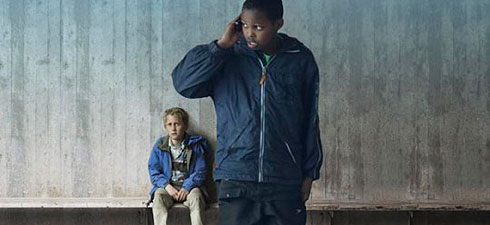Before going to see Play, I had read a number of commentaries which gave the impression that Ruben Östlund’s film was deliberately controversial on the issue of racism. So I was fully prepared for what I imagined would be an annoying bid for media attention.
But having seen the film, my opinion is that there is no reason for any such debate. Play is quite obviously an anti-racist film. That said, I now understand why Ruben Östlund preferred to make the first move. The debate on racism was inevitable.
Play tells the story of a gang of teenagers from deprived backgrounds who take advantage of prejudice directed against them (they are black) to shake down well-off kids they find around town. The robbers play on their victims’ prejudices and the director with those of the audience, to the point where it is hard to decide which side you are on.
At the start of the film, I was on the side of the kids from the suburbs – which is also my background – but I was put off when they attacked one of their own. At the same time, I was overcome by pity for the fragile middle-class kids and I was rooting for them until the scene where a middle class father decides to molest a child who assaulted his son, while explaining that what he is doing is for the kid’s own good.
First and foremost a film about class
The father reminded me of those football supporters petition to demand that Zlatan [Ibrahimović] be excluded from Malmö FF an incident that the footballer keeps coming back to in his autobiography. And that was the scene where I lost my self-control and gave in to an irrational class hatred based on my own prejudices. That was the moment when I stopped "playing."
And this is why Play is such a masterpiece. It portrays all of our prejudices and there is a moment – which happens sooner or later depending on the viewer – where "play" necessarily comes to an end. Prejudice is in the eye of the beholder, and Ruben Östlund allows us to choose the moment when we decide to hit stop or play.
To my mind, Ruben Östlund is a star that has been missing from the firmament of Swedish cinema for quite some time, someone who follows his own artistic path and speaks of his own era. He is someone who dares – notwithstanding inevitable accusations of racism – to depict a cruel class society where Swedes bully other Swedes.
For me, this is first and foremost a film about class — a theme which, unlike racism, relatively few people want to explore. All of the teenagers in the film speak Swedish, and there is never any question of race or ethnic origin, criteria that enable us to categorise groups on the basis of their origin rather than their social class.
Gothenburg — a city with inhabitants from 200 countries
The latter categorisation means that instead of seeing Swedes with no money and no hope, we see only black people. The debate on social class has become so bound up with the question of race to the point that, more often than, inequality is analysed through the prism of ethnic origin rather than the prism of social class.
The Swedish preview of the film took place in Backa Teater, in the Hisingen neighbourhood of Gothenburg, before an audience which was a reflection of the wonderful melting-pot that is today’s Sweden — anything but white and self-righteous.
And it will continue to play at the cinema where it wll be shown to school children from Gothenburg — a city with inhabitants from 200 ethnicities, which has often featured in debates on poverty, fear, segregation and hatred.
In choosing this venue, Ruben Östlund has done precisely what his detractors have accused him of not doing: he has assumed responsibility for his provocative narrative and presented his film to an audience of young people with no experience of art-house movies.
Debate
Can provocation help confront an issue?
Play, which tells the story of black teenagers stealing mobile phones from white children, has prompted a wide range of reactions in the Swedish press.
In Dagens Nyheter, a critic complains that director Östlund does not offer the audience an opportunity to see things from the “other’s” perspective, and has simply
... reinforced the narrative of a Sweden with an implicit “us,” and a “them” who are foreigners.
In the same daily another critic argues that film adroitly avoids facile explanatory models:
Who has a superior hold on power and who is oppressed – and why – remains an open and elastic question.
For Aftonbladet, Ruben Östlund is “an arty director who spits provocation without assuming any responsibility,” while the film maker himself, writing in Dagens Nyheter, insists that Play
... touches on a subject that was largely ignored [and that it is] a good means of raising the issue, although certainly not the only one.
Östlund’s story was inspired by a number of robberies committed by black teenagers in Gothenburg. Before writing the script, Östlund conducted interviews with the victims and the perpetrators. He explains that in speaking with the young offenders he was-
... very struck by the fact that, in spite of their young age, they had fully understood the stigmatising image of the black man, which they deliberately used to create an implicit sense of menace when they committed their robberies.
Was this article useful? If so we are delighted!
It is freely available because we believe that the right to free and independent information is essential for democracy. But this right is not guaranteed forever, and independence comes at a cost. We need your support in order to continue publishing independent, multilingual news for all Europeans.
Discover our subscription offers and their exclusive benefits and become a member of our community now!












